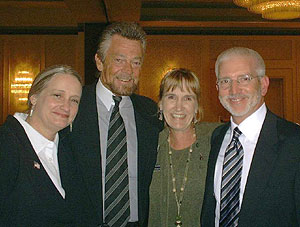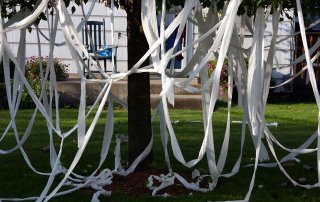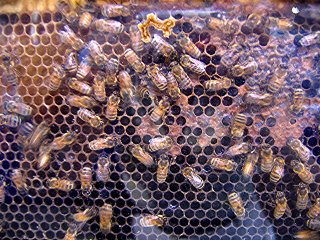If you're just tuning in -- you may want to read yesterday's post first.
So the Worthington case brought attention to the Massachusetts State Lab's DNA backlog, which stood at around 1000 cases in 2005.
Now, before I go further in this story, let's take a brief look at the word
backlog. Every jurisdiction comes up with its own meaning for this term, and you should be aware of some factors that influence how labs define them.
First, they
differentiate between "cases" and "samples." For DNA, a single case can include dozens (or dozens and dozens) of samples to be processed, or very few samples, down to one -- depending on what kind of case it is, how much biological evidence was available, and whether the people collecting the evidence were trained (at all, or well) and if they are feeling encouraged/discouraged about their lab.
Second, labs talk about two types of backlogs: 1) Those for cases -- items to be processed from crime scenes, victims, and those taken from suspects. 2) Those for databases -- the DNA samples taken from anyone required by that state's laws to submit them. That can range from those convicted of specific violent felonies to those convicted of any felony. (Some states, including California, have plans to eventually include felony
arrestees, although this will doubtless face some court challenges.) This second group is where DNA "cold hits" come from -- a DNA match in a case when there is no previously known suspect.
Third, in an effort to control backlogs, labs may limit what may be submitted to them. This seems to have been the case in Massachusetts. An Associated Press article by Theo Emery, published across the country in May, 2005 (I saw it in the
Houston Chronicle on 5/8/05), said
...The [Massachusetts] state crime lab is so understaffed and underfunded it has to ration how many tests law enforcement agencies may submit...
Each month, the state's 11 district attorneys are allowed to submit only four DNA samples.
"All the DAs are ludicrously handicapped in the number of cases that they can present to the lab," said Geline Williams, executive director of the Massachusetts District Attorneys Association....
Some might say (I would be one) therefore, that this 1000 case backlog was actually
artifically lowered. If you are behind on what's submitted, that's one number. If you refuse to allow more than 4 samples from each county into the flow, we're missing the real number -- add in all the cases in those counties that could benefit from DNA analysis and which are not in the chosen 4 samples.
Finally, labs do not have a set criteria for what constitutes a DNA sample that is "backlogged." Some will say 30 days. Others will say 90 days. Or more. There's no universally agreed-upon definition.
But by any of these definitions, Massachusetts law enforcement agencies that use the state lab had been waiting for results in 1000 cases. For each of those cases, someone who should have been held might be committing other crimes. Someone who was trying to investigate the crime had to use more time-consuming (and perhaps less reliable) methods of investigation, victims and their families waited for answers, and in all likelihood, some people who were innocent were under suspicion or denied their freedom.
In 2005, the state DNA lab operations had 12 analysts and their equipment squeezed into an 840-square-foot space. Six to nine months was the standard turnaround for cases submitted to the lab.
The Massachusetts Legislature realized that these were
undesirable conditions, and increased the funding of the lab from $6.2 million in fiscal 2005 to $16.2 million in fiscal 2007. They also created a new position in government -- Undersecretary for Forensic Sciences, part of the state's Office of Public Safety. This position was to provide oversight for improvements at the lab and the state medical examiner's office.
Keep in mind that no one gets money the day the Legislature takes a vote. But everyone seems to agree that things started to change for the better. Governor Romney sought additional money to build larger, more modern facilities, and a few months ago -- last August -- a new 12,000-square-foot addition was made to the lab.
The lab itself has been in the process of being revamped.
Then on January 12,
reports of an announcement from the State Police sent another kind of shock wave through Massachusetts: Robert E.
Pino, a civilian administrator, was accused of delaying reports of matches in the state's
CODIS system with evidence tested in eleven Massachusetts "cold case" rape cases. These delays meant the cases could not be prosecuted, because while delayed, the Massachusetts 15-year statute of limitations expired. Also, according to
the Boston Globe,
...In four cases, Pino prepared reports to police saying that tests linked DNA recovered at crime scenes to suspects, when, in fact, they had not. Pino did not mail all four reports, and no one was arrested because other officials discovered Pino's mistake....
All of this is still under investigation and while Mr.
Pino has been suspended,
it is important to note that no charges have been filed. Also, the reported problems were not in the actual analysis of DNA. According to a
story in the Boston Globe, his union, the Massachusetts Organization of State Engineers and Scientists, has defended him:
The union representing a suspended DNA database administrator at the State Police crime laboratory yesterday blamed any delays or DNA mismatches at the lab on a longstanding problem of understaffing and inadequate funding.
The
FBI is currently auditing the lab. The state has started work on
its own investigation into what went wrong, and how future problems may be prevented -- one apparent problem: "The administrator alone appeared to control the reporting of DNA test results to police and prosecutors."
Other officials have expressed concern that defense attorneys will react with a flood of motions challenging convictions.
If rapists are allowed to be free, if new attacks could have been prevented, if rape victims are denied justice because a lab employee didn't do his job, and if there is no reasonable explanation why he didn't do it (such as an overwhelming workload that one person couldn't reasonably cope with), this is a grave matter and there should be consequences for those responsible. And the lab does need to remedy any problems in its system of oversight that may have allowed such problems to occur.
I don't intend to speculate on Mr.
Pino's possible guilt or innocence regarding these allegations. But I do hope that Massachusetts State Senator Jarrett T. Barrios has been misquoted. According to the
Globe, he said these developments were especially alarming because of the money recently given to the lab, and added:
"The public has a right to know why their dollars, apparently, have been misspent."
Say what? Misspent? You've had an understaffed lab operating out of a
broom closet for a dozen years,
a thousand or more cases not even being analysed, and if one man screwed up in the way some claim he has, then all the money has been misspent????
The Massachusetts District Attorneys Association has said the lab has dramatically improved overall in recent years. It would be good to know how many cases have been successfully handled by the lab, how much matters have improved. Because I imagine if you talk to the victims and families of victims of those crimes, no one will feel that the money invested in the lab has been
misspent.
I think the Senator owes the other workers in the lab an apology.







